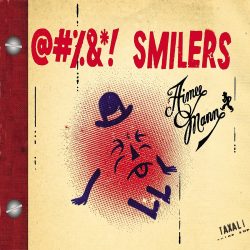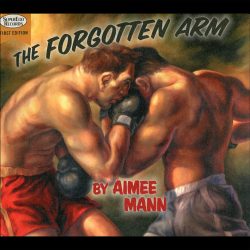
“One time the bass player from ‘Til Tuesday told me that she listened to me,” sings Dan Wilson with pride on ‘Grow Your Own’ from last year’s Semisonic album “Little Bit of Sun” (yes, that band that sang ‘Closing Time’ is releasing music again). It’s one of those “if you know you know” kind of references to none other than Aimee Mann. While being the bassist and lead vocalist for new wave outfit ‘Til Tuesday was actually a seminal part of Mann’s career, the band broke up in 1988 and her thirty plus years solo career in the time since has eclipsed anything they achieved to such a level it’s like ancient history – especially to younger listeners.
The object of this feature is to pick one album you “Can’t Live With” and another “You Can’t Live Without”; the former was an absolute no brainer for me, whereas the later took a little more thought. I did manage it though, and since I’m the sort of person who likes to get the bad out of the way first, we’re going to start with what I consider Mann’s “worst” album.

Can’t Live With It: “Smilers” (2008)
“@#%&*! Smilers” – or simply “Smilers”, as we’ll call it from here on out – is Mann’s seventh studio album and in my humble opinion, her weakest. Don’t get me wrong: out of all the albums that exist in the world, “Smilers” is far, far away from even touching the bottom of the list in terms of quality; but out of all the Aimee Mann albums that exist in the world? That’s a different thing entirely. What makes it even more disappointing is the fact that it was the next standard LP she released (not counting her Christmas album, 2006’s “One More Drifter in the Snow”) after 2005’s “The Forgotten Arm”, which I frankly consider one of the best albums ever recorded (more on that later).
I’ll be honest, I was unaware just why the album was titled as it was until I dug around a bit to write this piece, and the explanation of it almost makes me regretful of my decision to castigate it so cruelly. It turns out that back in the Web 1.0 day, Mann and a friend were members of a newsgroup called alt.bitter and there was a thread there where people were able to moan about those irritating individuals who always tell you to smile – hence the “@#%&*!” before the so-called “Smilers” in question.
Maybe the worst crime that “Smilers” commits is just how utterly forgettable it is, especially for something with such a whimsical, but oddly deep title. ‘Freeway’ is a fine opener that sees Mann singing in that sort of sunny-but-sad way she does so well about a drug addict who is fuelling his own downfall by using his charm and money to convince doctors to prescribe him drugs he shouldn’t be taking. Stripped down and piano backed, ‘Stranger to Starman’ feels like it could be a cool musing on the cult of celebrity, but in disappointing reality, it was inspired by a time Mann wrote “starman” as answer to an NY Times crossword clue when it should’ve been “stranger”.
‘Looking for Nothing’ and ‘Phoenix’ plod along, the story of a drifter at a fairground and someone cutting and running from Phoenix respectively, both feel like “Forgotten Arm” tracks that failed to make the cut for good reason. “Get up, the needle has pricked a little finger / She wants the beautiful child the blood will bring her2, sings Mann on ‘Borrowing Time’ before she goes on to evoke further well trodden fairytale imagery, although the use of horns does make this track standout in an interesting way to the others. ‘31 Today’ is memorable in the sense that I, like I’m sure many others, kept thinking of the chorus on my own 31st birthday (“I thought my life would be different somehow / I thought my life would be better by now”), although it’s otherwise a little repetitive. Holding a quiet undercurrent of violence, ‘Little Tornado’ speaks of a violent relationship in the clouded metaphor of a tornado hitting a trailer park, while the final track ‘Ballantines’ sees Mann perform a cutesy duet with Sean Hayes (that’s the singer-songwriter and not the ‘Will & Grace’ actor).
“Smilers” was only the second album after her Christmas LP that Mann’s bassist Paul Bryan produced for her, so it’s fair to ponder if someone else could have livened things up somewhat. At 13-tracks, it isn’t technically overly long, but still, it feels too much for a disparate collection of songs that meander more than they should and don’t leave lasting impression enough for their absence to trigger a sense of much of a loss.

Can’t Live Without It: “The Forgotten Arm” (2005)
I’m not going to lie, I love a concept album when it’s done well and for me, the Joe Henry produced “The Forgotten Arm” is one of the best examples of it done right, especially since on the surface, the premise doesn’t even sound all that compelling: John, a Vietnam veteran, meets Caroline at the Virginia State Fair in the 1970s when he’s boxing there. They fall in love and dream of fleeing together, but John’s addictions put their relationship under increasing strain.
The fitting 70s style chords that open ‘Dear John’, the album’s first track, never fails to send a shiver down my spine, but the lyrics are just as reaction-worthy: “Cotton candy was king / On the midway that spring / When I saw you in the ring on the lawn.” They’re evocative of an era, instantly transporting us to that fairground where Caroline first encounters John. Although ‘King of the Jailhouse’ finds John confessing to his failings to Caroline, he can only bring himself to do so when she’s sound asleep in the back seat of the car as they drive to what they hope is a better future.
Weighed down by the guilt of his addictions, ‘Goodbye Caroline’ finds John saying goodbye to Caroline, convinced that she’s better off free of him, although this just leads Caroline to question John as to the nature of his problems on ‘Going Through the Motions’, with John admitting to his chronic drinking on ‘I Can’t Get My Head Around It’: “Like way more real than real / The world inside the glass / That struggles to conceal / The wreckage on the overpass”, Mann sings on the bridge, succinctly summing up John’s issues with alcohol on four perfectly phrased lines.
John goes on to hit rock bottom on ‘She Really Wants You’, but this doesn’t deter Caroline as she still wants him back, flaws and all. “Tell me why I feel so bad, honey / TV’s flat and nothing is funny / I get sad and stuck in a cone of silence”, Mann sings from John’s perspective on ‘Video’, a track that sees him begin to realise that he has underlying mental health problems that can’t be quickly fixed. As much as Caroline loves John, she confesses on ‘That’s How I Knew This Story Would Break My Heart’ that his depression is weighing heavy on her and she can’t see a way to help him, prompting perhaps my favourite lyrics from the whole album: “So, like a ghost in the snow / I’m getting ready to go / ‘Cause baby, that’s all I know / How to open the door / And though the exit is crude / It saves me coming unglued / For when you’re not in the mood / For the gloves and the canvas floor”.
‘I Can’t Help You Anymore’, told from Caroline’s perspective, is fairly self explanatory from the title: Caroline, out of options to help John, has to leave to save herself. “I was thinking I could clean up for Christmas / And then call it a day / Tell you I’m sorry that I made you a witness / To my moral decay”, Mann tells us, now from John perspective, on ‘I Was Thinking I Could Clean Up For Christmas’, in which John feels he has finally turned a corner and is able to quit drinking for good. Whether John does or does not succeed in his goal to get clean isn’t entirely clear, but on the final track, ‘Beautiful’, we see John and Caroline reunite, leaving things on a hopeful, although not definitively happy note.
Overall, it’s a masterpiece in storytelling and I’d do anything to see it adapted to the screen. So if you need me, I’ll be over here waiting patiently for Paul Thomas Anderson to give “The Forgotten Arm” the “Magnolia” treatment it so rightfully deserves.



Love “The Forgotten Arm” … throwing kisses so Richmond’s unfortunates could go on
I agree on Smilers. I like the The Forgotten Arm, but I love Whatever and, to take a step back, I think of “Everything’s Different Now” as a solo album and it’s brilliant and doesn’t sound outdated in the least. That album packs a punch, and (Believed You Were) Lucky and The Other End of the Telescope are strong. Thanks –